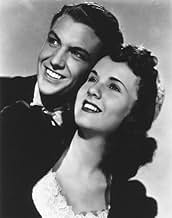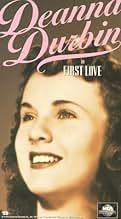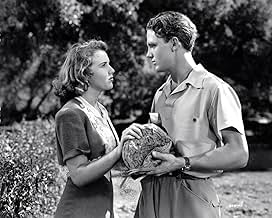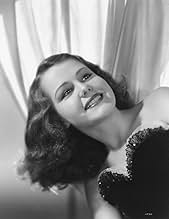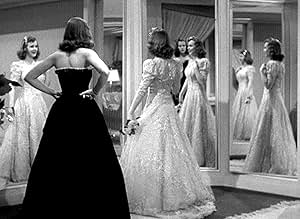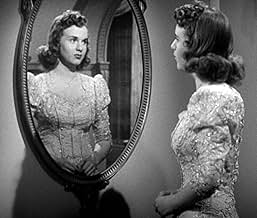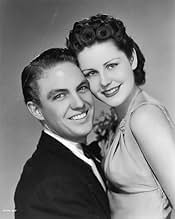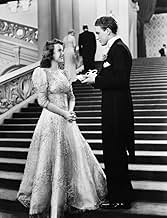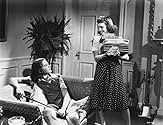An orphaned boarding school graduate secretly attends a prestigious ball, where she falls for the boyfriend of her snobbish cousin.An orphaned boarding school graduate secretly attends a prestigious ball, where she falls for the boyfriend of her snobbish cousin.An orphaned boarding school graduate secretly attends a prestigious ball, where she falls for the boyfriend of her snobbish cousin.
- Nominated for 2 Oscars
- 4 wins & 2 nominations total
Featured reviews
"First Love" was a major transition for Universal star Deanna Durbin, as she was being positioned to shift from child star to engenue (something that Fox was inevitably unable to accomplish with Shirley Temple at the same time). While the film is not an overblown epic, it's lavish in the details, and carefully produced to give the whole piece a maximum of charm. To today's audiences, it might be a bit saccharine, but if you can dial down the cynicism of our age, the film's positive points grow.
Durbin plays much more subtly in this film than she had in many of her earlier films--signalling that she was now "maturer" instead of being a juvenile whirlwind ball of energy like she had been in "Three Smart Girls" and "100 Men and a Girl." Her beau, played by an impossibly young (and almost scarily good looking) Robert Stack, gives Durbin her first screen kiss--a source of major publicity for the film at the time.
The story is an updated Cinderella/screwball comedy, which nevertheless allows Durbin's character to break out into a few operatic arias throughout the film (this also takes some getting used to for modern audiences). The most memorable part of the film, suitably, happens during "the ball," where Durbin and Stack dance for the first time. Employing a charming idea, a shot of a crowded dance floor dissolves to a shot of just the duo dancing, to imply how the pair are so involved with each other that the rest of the world has faded away. If you like stuff like this, then you'll revel in the rest of the film.
Durbin plays much more subtly in this film than she had in many of her earlier films--signalling that she was now "maturer" instead of being a juvenile whirlwind ball of energy like she had been in "Three Smart Girls" and "100 Men and a Girl." Her beau, played by an impossibly young (and almost scarily good looking) Robert Stack, gives Durbin her first screen kiss--a source of major publicity for the film at the time.
The story is an updated Cinderella/screwball comedy, which nevertheless allows Durbin's character to break out into a few operatic arias throughout the film (this also takes some getting used to for modern audiences). The most memorable part of the film, suitably, happens during "the ball," where Durbin and Stack dance for the first time. Employing a charming idea, a shot of a crowded dance floor dissolves to a shot of just the duo dancing, to imply how the pair are so involved with each other that the rest of the world has faded away. If you like stuff like this, then you'll revel in the rest of the film.
Deanna Durbin stars with Robert Stack, Helen Parrish, Leatrice Joy, Eugene Palette, and Kathleen Howard in "First Love," a 1939 update of the Cinderella story, with Deanna receiving her first screen kiss.
I first had to get over seeing Robert Stack so young - omg.
Deanna plays Constance Harding, an orphan who is spending the summer after her graduation with relatives. It's a sterile household with her uncle (Pallette) who doesn't want any noise and prefers his family be out of the house when he's there; an unbelievable brat of a cousin, Barbara (Parrish); and an airhead aunt (Joy). The only warmth available comes from the servants.
While her mother is busy doing astrology charts, Barbara enjoys the life of a much-photographed socialite and woman about town who has a closet the length of one wall. She's after the most eligible bachelor in town, Ted Drake.
One day, she doesn't wake up when she is called at noon and instead gets up at 2. She is invited to go riding at 2:30 with Ted and some others. Because she will be late, she sends Constance to the country club to hold Ted there by any means necessary. Constance does as she's told, but develops a crush on Ted.
The family is then invited to a fabulous party at Ted's. The servants get together and buy Constance a beautiful dress, a corsage, and a wrap from someone's relative.
Barbara takes one look at her and makes up a reason why Constance needs to stay home -- something Barbara's brother knew was going to happen all along. But unseen forces are at work.
This is Deanna before my favorite part of her career, which is a little later. As a little girl, she was too energetic and her speaking voice too high-pitched for me.
Here, she is delightful, but her singing voice, particularly the top, is thin. Later on, it would open up and be glorious. And Un Bel Di in English - it sounded like they took the literal translation and just had her sing it, with the words not only awkward, but out of order. Not a good choice for her, as the aria is for a much bigger sound, though it fit in very well with the theme.
What made this film a bittersweet experience for me was the beautiful acting of Kathleen Howard as the old maid with a cane, Miss. Wiggins. In those days, if you weren't married, you were nobody, and Miss Wiggins, beloved by her students, exemplifies that.
You can tell by the way she talks that she believes life passed her by, but being a strong woman, she has gone on and made the best of it. The end frame of her made me cry. Such an affecting, poignant performance.
I loved this film. Deanna's first kiss garnered a lot of attention; later, the first kiss was tried with Shirley Temple, but in 1942 wartime, no one cared.
I first had to get over seeing Robert Stack so young - omg.
Deanna plays Constance Harding, an orphan who is spending the summer after her graduation with relatives. It's a sterile household with her uncle (Pallette) who doesn't want any noise and prefers his family be out of the house when he's there; an unbelievable brat of a cousin, Barbara (Parrish); and an airhead aunt (Joy). The only warmth available comes from the servants.
While her mother is busy doing astrology charts, Barbara enjoys the life of a much-photographed socialite and woman about town who has a closet the length of one wall. She's after the most eligible bachelor in town, Ted Drake.
One day, she doesn't wake up when she is called at noon and instead gets up at 2. She is invited to go riding at 2:30 with Ted and some others. Because she will be late, she sends Constance to the country club to hold Ted there by any means necessary. Constance does as she's told, but develops a crush on Ted.
The family is then invited to a fabulous party at Ted's. The servants get together and buy Constance a beautiful dress, a corsage, and a wrap from someone's relative.
Barbara takes one look at her and makes up a reason why Constance needs to stay home -- something Barbara's brother knew was going to happen all along. But unseen forces are at work.
This is Deanna before my favorite part of her career, which is a little later. As a little girl, she was too energetic and her speaking voice too high-pitched for me.
Here, she is delightful, but her singing voice, particularly the top, is thin. Later on, it would open up and be glorious. And Un Bel Di in English - it sounded like they took the literal translation and just had her sing it, with the words not only awkward, but out of order. Not a good choice for her, as the aria is for a much bigger sound, though it fit in very well with the theme.
What made this film a bittersweet experience for me was the beautiful acting of Kathleen Howard as the old maid with a cane, Miss. Wiggins. In those days, if you weren't married, you were nobody, and Miss Wiggins, beloved by her students, exemplifies that.
You can tell by the way she talks that she believes life passed her by, but being a strong woman, she has gone on and made the best of it. The end frame of her made me cry. Such an affecting, poignant performance.
I loved this film. Deanna's first kiss garnered a lot of attention; later, the first kiss was tried with Shirley Temple, but in 1942 wartime, no one cared.
FIRST LOVE (Universal, 1939), directed by Henry Koster, stars Deanna Durbin in one of her ever popular movie roles. Basically a retelling of the old "Cinderella" story set in contemporary New York City, the youthful Durbin, making her sixth screen appearance, and Robert Stack, in movie debut, are supported by fine movie veterans, namely gravel voice Eugene Palette, Leatrice Joy (former lead actress of the silent screen), and Kathleen Howard in a small but important role as the crusty but wise old-maid school teacher with a heart of gold. Aside from her previous works opposite W.C. Fields in three classic comedies of the mid 1930s, this is one of the few times where Howard's talent as a true character actress is fully realized. And now back to Durbin's FIRST LOVE.
The plot begins at a high school graduation with the gathering of classmates receiving their diplomas, one being Constance "Connie" Harding (Deanna Durbin). With her parents dead and no relative in attendance, Connie is invited to spend the summer with her closest friend, Marcia (Marcia Mae Jones), but in good faith for all the financial support awarded her, she decides to stay with her uncle, James F. Clinton (Eugene Palette), a business tycoon, and his family. Afraid to face the challenge that awaits her, it is Miss Wiggens (Kathleen Howard), her former teacher, who encourages to move on, bringing hope and happiness to those around her. Although Connie does win over her uncle's servants, she's made to feel like an outsider by his wife, Grace (Leatrice Joy), spending much time studying astrology; Walter (Lewis Howard), their lazy son who'd rather be served than working; and Barbara (Helen Parrish), the stuck-up daughter who delights in giving orders and not taking them. Very much interested in high society's Ted Drake (Robert Stack), Barbara makes every effort keeping Connie away from him. Though invited to attend the ball with her mother and brother, and hope of meeting Ted again, Barbara purposely arranges for Connie to remain at home to entertain a visiting uncle from Washington during their absence. Feeling pity towards the disappointed Connie, the servants arrange having the family chauffeur (Jack Mulhall) purposely detain the Clintons by getting arrested while giving the opportunity for Connie to attend with the understanding she'd have to leave by midnight. After a grand evening with Ted, Connie, nearly forgetting the time, makes a hasty departure the very moment the Clintons arrive, leaving behind her one slipper found by Ted. When Barbara finds that Connie did attend the ball, their confrontation forces Connie to leave, causing Clinton, who cares for Connie, to become deeply ashamed for what his family has done.
In traditional thirties films depicting rich families, the Clintons in FIRST LOVE could very well be that of the Bullocks from the 1936 Universal comedy, MY MAN GODFREY, starring William Powell and Carole Lombard, each casting Eugene Palette as the millionaire with family he would rather forget. Instead of casting Alice Brady as the scatterbrained wife, Leatrice Joy is given the assignment, as did Lewis Howard's good-for-nothing son over Mischa Auer's freeloading protégé. There's no butler named Godfrey this time around, but good natured servants enacted by lesser known actors as Mary Treen (Agnes, the maid); Dorothy Vaughn (Ollie, the maid); Lucille Ward (The Cook); and Charles Coleman (George, the Butler). Other familiar faces as Frank Jenks (a Policeman and friend of the family servants); Samuel S. Hinds, Thurston Hall and Doris Lloyd fill in the void in lesser roles while Durbin highlights with her grand singing of "There's No Place Like Home," "Amapola." "Spring in My Heart" (by Johann Strauss) and "Un Bel Di" (One Fine Day) from Giacomo Puccini's "Madame Butterfly." Regardless of its title and Durbin's then publicized first screen kiss, FIRST LOVE is far from being trite formula. In fact, it's one of her and the studio's top productions of the year. Not having to resort to storybook fashion of "Cinderella," FIRST LOVE simply modernizes an old fairy tale, resulting to something quite original thanks to the fine screenplay, and natural, low-key performances by Durbin and Palette. Palette's great moment comes when he finally lets out steam telling off his selfish family, while Durbin adds humor during the ball by unwittingly stepping onto the platform in the place originally intended for another guest singer (Grace Hayle). There's also a touch of creativity in movie making in the ballroom sequence where all the guests virtually disappear in Connie's mind (and viewers) while dancing and conversing with Ted, and reappearing the very moment Connie returns to reality.
In spite of Durbin and her movies being the box office attractions at the time, presently appears to be of minor importance. Due to lack of television broadcasts since the 1980s, the time when FIRST LOVE had some exposure on public television, along with home video distribution in 1996, the Durbin products appear to be less popular due to its sugar sweet reputation. Having Durbin movies on DVD packages labeled "The Sweetheart Package" doesn't help matters either, yet looking back at these particular films whenever possible shows the entertaining values and certain star quality that has delighted audiences in an era so different from what's presented today. (***1/2)
The plot begins at a high school graduation with the gathering of classmates receiving their diplomas, one being Constance "Connie" Harding (Deanna Durbin). With her parents dead and no relative in attendance, Connie is invited to spend the summer with her closest friend, Marcia (Marcia Mae Jones), but in good faith for all the financial support awarded her, she decides to stay with her uncle, James F. Clinton (Eugene Palette), a business tycoon, and his family. Afraid to face the challenge that awaits her, it is Miss Wiggens (Kathleen Howard), her former teacher, who encourages to move on, bringing hope and happiness to those around her. Although Connie does win over her uncle's servants, she's made to feel like an outsider by his wife, Grace (Leatrice Joy), spending much time studying astrology; Walter (Lewis Howard), their lazy son who'd rather be served than working; and Barbara (Helen Parrish), the stuck-up daughter who delights in giving orders and not taking them. Very much interested in high society's Ted Drake (Robert Stack), Barbara makes every effort keeping Connie away from him. Though invited to attend the ball with her mother and brother, and hope of meeting Ted again, Barbara purposely arranges for Connie to remain at home to entertain a visiting uncle from Washington during their absence. Feeling pity towards the disappointed Connie, the servants arrange having the family chauffeur (Jack Mulhall) purposely detain the Clintons by getting arrested while giving the opportunity for Connie to attend with the understanding she'd have to leave by midnight. After a grand evening with Ted, Connie, nearly forgetting the time, makes a hasty departure the very moment the Clintons arrive, leaving behind her one slipper found by Ted. When Barbara finds that Connie did attend the ball, their confrontation forces Connie to leave, causing Clinton, who cares for Connie, to become deeply ashamed for what his family has done.
In traditional thirties films depicting rich families, the Clintons in FIRST LOVE could very well be that of the Bullocks from the 1936 Universal comedy, MY MAN GODFREY, starring William Powell and Carole Lombard, each casting Eugene Palette as the millionaire with family he would rather forget. Instead of casting Alice Brady as the scatterbrained wife, Leatrice Joy is given the assignment, as did Lewis Howard's good-for-nothing son over Mischa Auer's freeloading protégé. There's no butler named Godfrey this time around, but good natured servants enacted by lesser known actors as Mary Treen (Agnes, the maid); Dorothy Vaughn (Ollie, the maid); Lucille Ward (The Cook); and Charles Coleman (George, the Butler). Other familiar faces as Frank Jenks (a Policeman and friend of the family servants); Samuel S. Hinds, Thurston Hall and Doris Lloyd fill in the void in lesser roles while Durbin highlights with her grand singing of "There's No Place Like Home," "Amapola." "Spring in My Heart" (by Johann Strauss) and "Un Bel Di" (One Fine Day) from Giacomo Puccini's "Madame Butterfly." Regardless of its title and Durbin's then publicized first screen kiss, FIRST LOVE is far from being trite formula. In fact, it's one of her and the studio's top productions of the year. Not having to resort to storybook fashion of "Cinderella," FIRST LOVE simply modernizes an old fairy tale, resulting to something quite original thanks to the fine screenplay, and natural, low-key performances by Durbin and Palette. Palette's great moment comes when he finally lets out steam telling off his selfish family, while Durbin adds humor during the ball by unwittingly stepping onto the platform in the place originally intended for another guest singer (Grace Hayle). There's also a touch of creativity in movie making in the ballroom sequence where all the guests virtually disappear in Connie's mind (and viewers) while dancing and conversing with Ted, and reappearing the very moment Connie returns to reality.
In spite of Durbin and her movies being the box office attractions at the time, presently appears to be of minor importance. Due to lack of television broadcasts since the 1980s, the time when FIRST LOVE had some exposure on public television, along with home video distribution in 1996, the Durbin products appear to be less popular due to its sugar sweet reputation. Having Durbin movies on DVD packages labeled "The Sweetheart Package" doesn't help matters either, yet looking back at these particular films whenever possible shows the entertaining values and certain star quality that has delighted audiences in an era so different from what's presented today. (***1/2)
Deanna Durbin is the poor cousin of a rich family. She attends Kathleen Howard's girl's school with cousin Helen Parish, and gets invited to their New York mansion for Christmas break. Even though uncle Eugene Pallette seems nice enough -- what little is seen of him -- the rest of the family is a bunch of weirdos and nasties. She wants to go to the ball, but has to wear cast-off clothes. But the mansion's staff, who adore her for singing for them, club together and rent an expensive outfit. When Miss Parish orders her not to go to the ball....
Miss Durbin was Universal's biggest star, but how were they to deal with the fact that she was now 17 and could no longer be Little Miss Fix-It? Her production team, consisting of Henry Koster and Joe Pasternak decided to write her a Cinderella story, with newly-hired Robert Stack as Prince Charming. Of course there are musical interludes, an old-fashioned ballad or two, and a selection of opera arias. The writing team kept everything familiar, including borrowing liberally from My Man Godfrey to make sure that Miss Durbin's fans wouldn't be too outraged.
Miss Durbin was Universal's biggest star, but how were they to deal with the fact that she was now 17 and could no longer be Little Miss Fix-It? Her production team, consisting of Henry Koster and Joe Pasternak decided to write her a Cinderella story, with newly-hired Robert Stack as Prince Charming. Of course there are musical interludes, an old-fashioned ballad or two, and a selection of opera arias. The writing team kept everything familiar, including borrowing liberally from My Man Godfrey to make sure that Miss Durbin's fans wouldn't be too outraged.
"First Love" is a delightful 20th century Cinderella story, with good songs by Deanna Durbin and some light comedy. The film was nominated for three Academy Awards. Since most people know the Cinderella plot, a lot more need not be said. Except that a very good supporting cast does justice to a good screenplay in this modern adaptation of the story.
Durbin is Constance Harding in the Cinderella role. The prince role is Ted Drake, played by Robert Stack. There isn't a fairy godmother, a pumpkin or adaptable mice. But this Cinderella has relatives with a house and servants who take to her. And, a somewhat beleaguered and withdrawn Uncle James Clinton (played by Eugene Pallette), who eventually comes to life thanks to Constance.
When she is rejected by her cousins, Constance returns to the orphanage where she was raised. She had known family there, among all the other girls, the teachers and the director, Miss Wiggins (played by Kathleen Howard). She says she will stay there and become a teacher also. But she gets some sage counseling from Miss Wiggins.
Miss Wiggins, "Do you like cats?" Constance Harding, "No, not much." Miss Wiggins, "Huh! You'll get to love them. They've got sense. They're like men. Feed them, pet them, and admire them, and they'll purr. Every woman wants to make somebody purr. You want to lock yourself up in a world of women."
Constance notices the ladies of the faculty with tears on their faces listening to her sing a beautiful aria. She later asks Miss Wiggins about it. Wiggins says, "Old maids ore only happy when they cry. You'll find that out."
But, just as in the fairy tale, the prince charming in this film finds his Cinderella. And Ted Drake sees to it that Constance won't be among the spinster faculty at the orphanage. It's an entertaining film that the whole family should enjoy.
Durbin is Constance Harding in the Cinderella role. The prince role is Ted Drake, played by Robert Stack. There isn't a fairy godmother, a pumpkin or adaptable mice. But this Cinderella has relatives with a house and servants who take to her. And, a somewhat beleaguered and withdrawn Uncle James Clinton (played by Eugene Pallette), who eventually comes to life thanks to Constance.
When she is rejected by her cousins, Constance returns to the orphanage where she was raised. She had known family there, among all the other girls, the teachers and the director, Miss Wiggins (played by Kathleen Howard). She says she will stay there and become a teacher also. But she gets some sage counseling from Miss Wiggins.
Miss Wiggins, "Do you like cats?" Constance Harding, "No, not much." Miss Wiggins, "Huh! You'll get to love them. They've got sense. They're like men. Feed them, pet them, and admire them, and they'll purr. Every woman wants to make somebody purr. You want to lock yourself up in a world of women."
Constance notices the ladies of the faculty with tears on their faces listening to her sing a beautiful aria. She later asks Miss Wiggins about it. Wiggins says, "Old maids ore only happy when they cry. You'll find that out."
But, just as in the fairy tale, the prince charming in this film finds his Cinderella. And Ted Drake sees to it that Constance won't be among the spinster faculty at the orphanage. It's an entertaining film that the whole family should enjoy.
Did you know
- TriviaDeanna Durbin's character gives her birthdate as 4 December - Durbin's own.
- GoofsThe movement of Deanna during the scene with her mirror.
- Quotes
Miss Wiggins: The trouble with you young people is you don't believe in anything. You're afraid, afraid of hope, afraid of happiness.
- ConnectionsFeatured in Hers to Hold (1943)
- How long is First Love?Powered by Alexa
Details
- Runtime
- 1h 24m(84 min)
- Color
- Aspect ratio
- 1.37 : 1
Contribute to this page
Suggest an edit or add missing content

